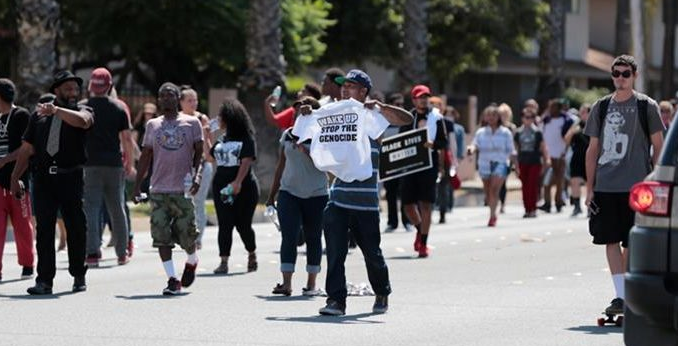
Crowds gathered in the Californian city of El Cajon to protest against US police brutality after the killing of Alfred Olango, an unarmed black man, as the FBI joined an investigation into his death.
According to family and witnesses, police officers fired a taser and then several bullets at Olango, a 38-year-old Ugandan refugee, after his sister called the department for assistance because her sibling was acting strangely, and not like himself.
Candles and flowers were left on Wednesday at the shooting scene, near bloodstains on the pavement.
Dozens protested outside the police station, holding signs that read “No Killer Cops!” and chanting “No justice, no peace,” and “Black lives matter.”
Those protests, which were peaceful, continued until the early hours of Thursday.
Dan Gilleon, a lawyer for the family, said that Olango – described by his relatives as mentally ill – was distraught over the recent death of his best friend.
Olango was shot on Tuesday after two officers arrived at a parking lot next to a Mexican fast-food restaurant about 210pm local time, more than an hour after being called to the scene . The Ugandan-born refugee was shot about a minute later.
Police said that during those 60 seconds, Olango refused to comply with instructions to remove a hand from his pocket and paced back and forth before rapidly drawing an object from the pocket. The item turned out to be an electronic cigarette device.
Some protesters said Olango was shot while his hands were raised in the air, though police disputed that and produced a single frame from a cellphone video to support their account.
The image showed the man in what police called a “shooting stance”. His hands were clasped together and he was pointing directly at an officer who had assumed a similar posture a few feet away. That officer fired his handgun and a second officer, farther away, simultaneously fired his electric stun gun.
The single photo is all police released depicting the incident that sparked angry protests by demonstrators demanding more information and wanting to know how police could shoot an unarmed man.
Olango’s family also demanded the full video be released.
“They’re cherry-picking part of the video,” family lawyer Gilleon said. “This is exactly what police have said is unfair when only portions of video are released against them.”
As per standard procedure, the officers involved in Olango’s killing were placed on administrative leave.
One of the officers involved was demoted last year amid allegations that he sexually harassed a lesbian colleague, according to the Associated Press news agency. The case against him is pending.
The aftermath of the fatal shooting was filmed by a bystander who posted the clip on Facebook. By early Thursday, that video had been viewed 130,000 times.
“Why couldn’t you tase him? I told you he is sick – and you guys shot him!” Olango’s sister can be heard telling officers in the video. “I called police to help him, not to kill him.”
Bill Wells, the mayor of El Cajon, said he was concerned how quickly the shooting took place, and described the bystander’s video as enlightening.
It was not “tremendously complicated to figure out what happened”, he said.
“I saw a man who was distraught, and a man acting like he was in great pain,” Wells said. “And I saw him get gunned down and killed. If he was my son, I would be devastated.”
‘My heart has broken’
El Cajon gives officers basic training to deal with mental illness, though a psychiatric clinician on duty was on another call and not available to intervene, police said.
A city of 100,000 people about 24km northeast of San Diego, El Cajon has become home for many refugees fleeing Iraq and, more recently, Syria. The population is 69 percent white and 6 percent black, according to 2010 census figures.
Agnes Hassan, originally from Sudan, described Olango as an educated man with mental problems. She said she spent time in a refugee camp with Olango and that both of them suffered getting to the US.
“If somebody has mental problem, how can you not deal with him with mental problem?” she said, wiping away tears and placing her hand on her chest. “This is not right. My heart has just broken.”
The fatal shooting happened less than two weeks after black men were shot and killed by police in Tulsa, Oklahoma, and Charlotte, North Carolina, where violent protests broke out.
According to Mapping Violence, police have killed at least 217 black people so far this year.
Source: Today.ng
